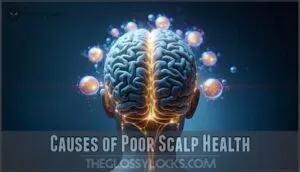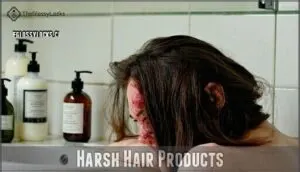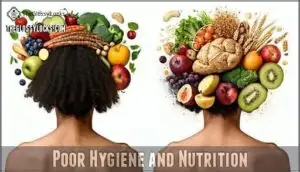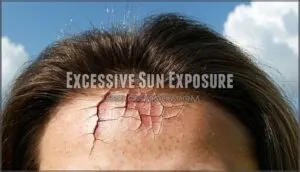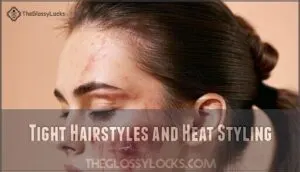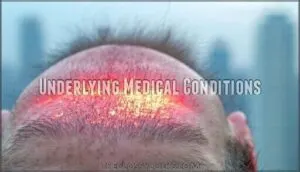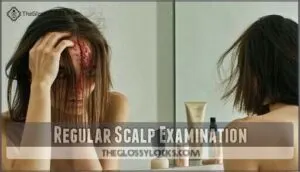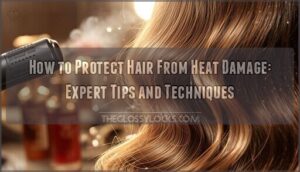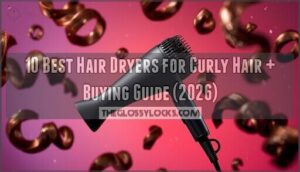This site is supported by our readers. We may earn a commission, at no cost to you, if you purchase through links.

You’re likely dealing with harsh shampoos that strip natural oils, poor hygiene habits that let bacteria flourish, or underlying medical conditions like hormonal imbalances and autoimmune disorders.
Nutritional deficiencies starve your hair follicles, while excessive heat styling and tight hairstyles damage delicate skin.
Chronic stress throws your body’s healing processes off balance, and environmental culprits like sun exposure and pollution create inflammation.
Understanding what causes poor scalp health is your first step toward restoration, and The solutions might surprise you with their simplicity.
Table Of Contents
- Key Takeaways
- Scalp Health Issues
- Causes of Poor Scalp Health
- Scalp Irritation Factors
- Underlying Medical Conditions
- Maintaining Healthy Scalp
- Frequently Asked Questions (FAQs)
- Why is my scalp health so bad?
- What illnesses cause scalp issues?
- How can I improve my scalp health?
- What are the symptoms of poor scalp circulation?
- How does air pollution impact scalp health?
- Can water quality affect scalp conditions?
- Do seasonal changes influence scalp issues?
- Is scalp health linked to sleep quality?
- How does aging impact scalp health?
- Conclusion
Key Takeaways
- You’re likely damaging your scalp with harsh shampoos, tight hairstyles, and excessive heat styling, which strip oils and weaken hair follicles.
- Poor hygiene, nutritional deficiencies, and stress create conditions for infections, inflammation, and hair thinning.
- Environmental factors like pollution and sun exposure inflame your scalp, while seasonal changes and hard water worsen dryness or oiliness.
- Underlying issues like autoimmune disorders, hormonal imbalances, and chronic illnesses often disrupt your scalp’s natural balance, leading to persistent scalp problems.
Scalp Health Issues
Your scalp’s health directly impacts your hair’s strength, growth rate, and overall appearance, yet many people overlook early warning signs until problems become severe.
Your scalp whispers warnings long before your hair starts screaming for help—are you listening?
Common scalp issues include persistent dandruff, excessive oiliness, irritation, inflammation, and noticeable hair thinning, which often stem from underlying skin conditions, infections, or follicle dysfunction that requires targeted treatment to address the root cause of these scalp issues.
Skin Conditions and Infections
Skin conditions frequently create the perfect storm for scalp problems.
Scalp eczema triggers intense itching and flaking, while scalp psoriasis forms thick, silvery patches that resist typical treatments.
Bacterial infections often develop when you scratch irritated areas, creating open wounds.
Scalp fungus thrives in warm, moist environments, causing persistent irritation.
These scalp conditions interconnect, making proper diagnosis essential for effective treatment of scalp problems.
Hair Loss and Shedding
Losing more than 100 hairs daily signals underlying scalp conditions affecting your follicles.
Telogen effluvium pushes growing hairs into resting phase, causing widespread hair thinning from stress or illness.
Alopecia areata creates patchy hair loss through autoimmune attacks on follicles.
Scalp inflammation from irritation leads to follicle damage, disrupting normal growth cycles and triggering excessive hair shedding.
Fungal Infections and Parasites
Beyond shedding lies another scalp threat you can’t ignore. Fungal infections like ringworm create red, scaly patches while malassezia yeast triggers persistent scalp flakes. These microscopic invaders thrive in warm, moist environments.
- Scalp fungus spreads through contaminated brushes and towels
- Antifungal properties in medicated shampoos combat yeast overgrowth
- Parasite control requires consistent treatment for complete elimination
Professional ringworm treatment guarantees infection management success.
Causes of Poor Scalp Health
Your scalp’s health depends on multiple factors that often work together to create problems you can’t see until symptoms appear.
Understanding these underlying causes helps you identify which specific issues affect your scalp and develop targeted solutions for lasting improvement.
Your scalp’s health is a complex issue, but knowing the underlying causes can help you address the root of the problem.
Key Challenges And Solutions
Poor scalp health creates a domino effect you can’t ignore.
Scalp inflammation from harsh products triggers scalp sores and persistent itching.
You’ll notice flaking treatment becomes necessary when scalp irritation worsens.
The solution? Switch to sulfate-free shampoos for itch relief and gentle scalp massage to promote hair regrowth.
Managing stress prevents scalp conditions from spiraling into chronic scalp damage.
Future Trends To Watch
Scalp care’s getting a major tech upgrade.
AI Diagnostics and Scalp Monitoring apps now analyze your hair health through smartphone photos, while Virtual Consults connect you with specialists worldwide.
Hair Tech companies are developing Personalized Products based on your unique scalp profile.
These innovations make professional-grade scalp health assessments accessible from home, revolutionizing how you approach scalp nourishment and prevention.
Practical Applications In Use
You can transform your scalp health by implementing evidence-based strategies that address root causes effectively.
These practical approaches help restore balance and prevent future damage through targeted interventions.
- Scalp Massage – Perform gentle circular motions daily to improve blood circulation and reduce stress-related hair loss
- Dietary Changes – Add omega-3 rich foods like salmon and walnuts to support follicle health
- Product Ingredients – Choose sulfate-free shampoos with natural remedies like tea tree oil
- Scalp Moisturization – Apply lightweight oils to combat scalp dryness without clogging pores
- Scalp Exercises – Practice stress-reduction techniques since tension affects your scalp care routine
Hair Analysis remains unreliable for determining nutritional deficiencies, so focus on proven methods instead.
Understanding scalp health basics is essential for developing effective hair care routines.
Scalp Irritation Factors
Your scalp can become irritated from everyday habits you mightn’t even realize are causing damage.
These common factors include harsh chemical products, poor hygiene practices, excessive sun exposure, and tight hairstyles that create ongoing stress on your hair follicles and surrounding skin, which can lead to irritation due to excessive sun exposure.
Harsh Hair Products
Why does your scalp feel constantly irritated despite regular washing?
Harsh shampoos containing sulfates strip natural oils, causing chemical damage and scalp sensitivity. Product buildup from hair dyes creates residue that blocks follicles, while shampoo irritation leads to inflammation.
Understanding these sulfate effects helps you choose gentler alternatives. Considering a sulfate free option can be beneficial for reducing scalp irritation.
| Chemical Culprit | Scalp Impact | Common Sources |
|---|---|---|
| Sulfates (SLS/SLES) | Strips natural oils, causes dryness | Most commercial shampoos |
| Synthetic Fragrances | Triggers allergic reactions, irritation | Scented hair products |
| Formaldehyde | Carcinogenic, causes severe damage | Preservatives in conditioners |
Poor Hygiene and Nutrition
Beyond product irritants, your daily habits play a bigger role than you’d think.
Skipping regular washing creates buildup that clogs follicles, while crash diets lacking protein and iron trigger poor hair growth.
Here’s how hygiene habits and nutritional deficiencies create scalp conditions:
- Infrequent washing – Allows oil and dead skin to accumulate, leading to dry scalp or oily scalp imbalances
- Crash dieting – Nutrient deficits from poor diet cause malnutrition effects like brittle, thinning hair
- Protein deficiency – Weakens hair follicles, resulting in increased shedding and breakage
- Iron deficiency – Creates an environment for scalp infections and compromised healing
- Vitamin deficiency – B12 and zinc shortages directly impact scalp health and hair structure
Addressing these issues often requires proper scalp treatment products and a balanced diet to promote healthy hair growth.
Excessive Sun Exposure
When you’re out in the sun without proper scalp protection, UV rays penetrate through your hair and directly damage the delicate skin underneath.
This sun damage leads to scalp inflammation, making your hair brittle and prone to breakage.
Scalp burns can occur within hours, especially on thinning areas where hair coverage is sparse.
| UV Exposure Level | Scalp Risk | Hair Damage | Protection Needed |
|---|---|---|---|
| Mild (1-2 hours) | Light redness | Slight dryness | Basic sunscreen use |
| Moderate (3-5 hours) | Noticeable burns | Hair becomes brittle | SPF 30+ protection |
| Severe (6+ hours) | Painful scalp inflammation | Significant breakage | Full UV protection |
| Chronic exposure | Permanent damage | Texture changes | Daily preventive care |
Your scalp health depends on consistent UV protection, just like the rest of your skin requires sunscreen use for ideal health.
Tight Hairstyles and Heat Styling
Your daily style choices can silently sabotage your scalp’s health.
Tight ponytails, braids, and buns create constant scalp strain, leading to hair traction and eventual hair loss.
Heat styling tools compound the problem, causing heat damage that weakens follicles and triggers hair breakage.
This relentless scalp tension from aggressive styling disrupts your hair’s natural growth cycle, creating lasting hair styling damage.
Understanding the impact of scalp health issues is essential to preventing long-term damage and promoting healthy hair growth.
Underlying Medical Conditions
Sometimes your scalp problems aren’t just about what you’re using on your hair—they’re actually warning signs of underlying health conditions that affect your entire body.
Medical conditions like autoimmune disorders, thyroid imbalances, diabetes, and nutrient deficiencies can disrupt your scalp’s natural balance, leading to persistent irritation, hair loss, and chronic inflammation that won’t respond to typical treatments.
These conditions can be indicative of a larger issue, and addressing the underlying health conditions is crucial for resolving scalp problems.
Autoimmune Disorders
Your immune system sometimes turns against your own hair follicles, triggering autoimmune conditions like Alopecia Areata and Scalp Psoriasis.
When your body becomes its own worst enemy, your hair pays the ultimate price.
These autoimmune reactions cause sudden hair loss and skin inflammation, creating painful patches on your scalp.
When your body mistakenly attacks healthy tissue, it disrupts normal hair growth cycles and compromises overall scalp health through chronic inflammation.
Understanding autoimmune disease mechanisms is essential for addressing the root causes of poor scalp health, including the impact of autoimmune disease.
Hormonal Imbalances
Your body’s hormone factory can throw your scalp into chaos when things go haywire.
Hormonal imbalances disrupt your hair’s natural growth cycle, leading to unexpected shedding and scalp irritation that catches you off guard.
- Thyroid Issues – Both overactive and underactive thyroid conditions trigger significant hair loss and scalp dryness
- Menstrual Cycle Changes – Monthly hormone fluctuations can cause temporary scalp sensitivity and increased shedding
- Estrogen Dominance – Too much estrogen relative to progesterone creates scalp inflammation and thinning hair
- Adrenal Fatigue – Chronic stress hormones weaken hair follicles and compromise overall scalp health
Addressing these issues often requires understanding of natural remedies for hormone balance.
Nutrient Deficiencies
Behind every strand of thinning hair lies a nutritional story your body’s desperately trying to tell.
When you’re missing essential nutrients, your scalp suffers first.
Iron Deficit starves follicles of oxygen, while Vitamin Lack disrupts growth cycles.
Hair nutritional deficiency isn’t just about what you eat—it’s about absorption too.
| Deficiency Type | Hair Impact | Scalp Symptoms |
|---|---|---|
| Iron Deficit | Excessive shedding, weak strands | Pale, sensitive scalp |
| Vitamin B12 Deficiency | Premature graying, slow growth | Inflammation, irritation |
| Protein Insuff | Brittle, breaking hair | Flaky, dry patches |
| Omega3 Fatty Acids | Dull, lifeless appearance | Tight, uncomfortable feeling |
| Mineral Shortage | Patchy thinning areas | Persistent itchiness |
Your scalp’s nutrient demands mirror your body’s needs.
Nutrient Imbalance creates a domino effect—vitamin deficiency in one area triggers problems elsewhere.
When nutrients can’t reach your follicles properly, even a balanced diet won’t solve the underlying Nutrient Deficiencies affecting your hair’s foundation.
Chronic Conditions Like Diabetes
Chronic conditions like diabetes create a perfect storm for scalp problems.
When your blood sugar runs high, it triggers chronic inflammation that weakens hair follicles.
Insulin resistance disrupts hormonal balance, while poor circulation limits nutrient delivery to your scalp.
Diabetes management becomes essential since uncontrolled glucose levels can accelerate hair loss and slow healing of scalp irritations, making diabetes management crucial.
Maintaining Healthy Scalp
You can prevent most scalp problems by establishing simple daily habits that protect your hair’s foundation from damage.
Regular examination, gentle care routines, proper nutrition, and stress management work together to maintain healthy scalp health.
They prevent the seven hidden culprits from wreaking havoc on your hair, by working together to maintain healthy scalp health and prevent damage.
Regular Scalp Examination
Weekly scalp checks can catch problems before they escalate into serious scalp conditions.
Run your fingers through different sections, feeling for bumps, scabs, or tender spots that signal underlying scalp health issues.
Look for unusual redness, flaking, or hair thinning patterns during your health monitoring routine.
Early detection through regular scalp examination prevents minor scalp problems from becoming major concerns, allowing for early detection and intervention.
Gentle Hair Care Routine
Looking after your scalp doesn’t require expensive treatments.
Switch to gentle shampoo that won’t strip natural oils.
Use soft brushes to prevent irritation during daily routines.
Incorporate scalp massage with nourishing hair oils like coconut or jojoba.
These natural remedies support scalp cleansing while maintaining moisture.
Your gentle hair care routine becomes the foundation for lasting scalp health.
Understanding the importance of pH balance levels is essential for creating an effective scalp care routine, as explained in the link to pH balance levels, which is crucial for a healthy scalp.
Balanced Diet and Nutrition
A gentle hair care routine is great, but your scalp craves more—like proper nourishment.
Nutrient deficiencies directly impact scalp health.
For ideal hair nourishment:
- Eat protein-rich foods to strengthen follicles.
- Include omega-3s for hydration and shine.
- Balance vitamins (A, D, E) to prevent dryness.
- Avoid food allergies by monitoring triggers.
Maintaining a healthy scalp also involves understanding the role of hair growth vitamins.
Healthy eating fuels scalp vitality and is essential for hair growth with the right hair care.
Stress Management and Relaxation Techniques
High stress levels trigger telogen effluvium, pushing hair follicles into premature resting phases.
You can combat this through meditation techniques and mindfulness exercises that lower cortisol production.
Deep breathing therapy activates your parasympathetic nervous system, reducing scalp irritation.
Regular relaxation methods like progressive muscle relaxation help maintain healthy hair growth cycles, proving that managing stress directly supports scalp health.
Frequently Asked Questions (FAQs)
Why is my scalp health so bad?
Your scalp might be crying out for help due to stress, harsh products, or poor hygiene.
Nutritional gaps, fungal infections, or even allergies could also play a role.
It’s time to investigate and adapt!
What illnesses cause scalp issues?
Illnesses like psoriasis, eczema, seborrheic dermatitis, and fungal infections can wreak havoc on your scalp.
Autoimmune conditions, thyroid disorders, and chronic diseases like diabetes or anemia also impact scalp health, causing irritation, flaking, or hair loss.
How can I improve my scalp health?
Think of your scalp as fertile soil for healthy hair.
Keep it clean with gentle shampoos, nourish it with a balanced diet, avoid harsh products, and stay hydrated.
Regularly check for issues and consult professionals if needed.
What are the symptoms of poor scalp circulation?
Poor scalp circulation can cause thinning hair, slower growth, dryness, and a tight, itchy feeling.
You might notice dull strands or increased shedding.
It’s like your scalp’s “fuel pump” isn’t delivering nutrients efficiently, which can be summarized as a problem of poor scalp circulation causing various issues, including thinning hair.
How does air pollution impact scalp health?
Imagine your scalp as a garden—air pollution clogs its "soil" with toxins, weakening hair roots.
Particulate matter, dirt, and chemicals trigger inflammation, dryness, and dandruff.
Regular cleansing helps detoxify and restore your scalp’s balance.
Can water quality affect scalp conditions?
Yes, hard water can worsen scalp conditions by leaving mineral residue that clogs hair follicles, causing dryness, irritation, or dandruff.
Softening your water or using clarifying shampoos helps protect your scalp’s health.
Do seasonal changes influence scalp issues?
Seasonal shifts can ruffle your scalp’s balance.
Cold, dry air often triggers flakiness and itchiness, while humid summers may lead to oiliness and dandruff.
Adjusting your hair care routine helps tackle these seasonal swings effectively, and finding the right approach can lead to a healthier scalp and more manageable hair, reducing itchiness.
Is scalp health linked to sleep quality?
Sleep quality directly impacts scalp health.
Poor rest disrupts hormonal balance, increasing stress and inflammation, which can trigger conditions like dandruff or hair loss.
Prioritize good sleep hygiene to support overall scalp and hair wellness.
How does aging impact scalp health?
Aging reduces scalp oil production, leading to dryness and itchiness.
Hair follicles shrink, slowing growth and causing thinning.
Blood circulation decreases, impacting nutrient delivery.
Protect your scalp with gentle care, hydration, and regular dermatologist check-ups to ensure gentle care.
Conclusion
Spotting scalp stressors starts with understanding what causes poor scalp health.
From harsh hair habits to hidden hormonal hurdles, small changes can make a big difference.
Swap stripping shampoos for gentler options, nourish your follicles with a balanced diet, and shield your scalp from sun damage.
Don’t let tight hairstyles or chronic stress tighten their grip on your hair’s health.
By addressing these culprits, you’ll pave the way for a soothed scalp and stronger strands.
- https://my.clevelandclinic.org/staff/31691-manjaree-daw
- https://www.instagram.com/dririsrubin/
- https://www.everydayhealth.com/psoriasis/living-with/autoimmune-diseases-affect-your-appearance/
- https://rheumatologistoncall.com/2024/05/14/hair-loss-in-autoimmune-diseases/
- https://www.hims.com/blog/autoimmune-disease-hair-loss

